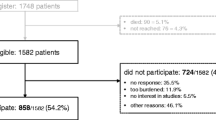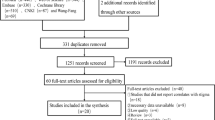Abstract
Background
To make an informed choice, breast cancer patients facing surgery must imagine the effect of surgery on their future life experiences. However, the accuracy of patient predictions of postoperative quality of life (QoL) and disease-related stigma is not well understood.
Materials and Methods
Four groups of breast cancer patients at the University of Michigan Medical Center were surveyed by mail and interview (response rate 76.3%): (1) preoperative (N = 59), (2) mastectomy (N = 146), (3) mastectomy with reconstruction (N = 250), and (4) breast conservation (N = 705). Subjects rated their QoL (1 = lowest, 100 = highest) and stigma (1 = lowest, 5 = highest) and estimated QoL and stigma associated with mastectomy alone, mastectomy with reconstruction, and breast conserving surgery (BCS). Mean scores were compared using linear regression controlling for age, race, partnered status, and income.
Results
Preoperatively, women inaccurately predicted postoperative QoL and stigma for all surgical options, particularly for mastectomy. Preoperative patients underestimated the postoperative QoL for mastectomy alone (predicted: 56.8 vs actual: 83.7; P < .001). Preoperative patients underestimated QoL following mastectomy following reconstruction (predicted: 73.4 vs actual: 83.9; P < .001) and BCS (predicted: 72.2 vs actual: 88.6; P < .001). Additionally, preoperative patients overestimated stigma related to mastectomy (predicted: 3.25 vs actual: 2.43; P < .001). Finally, preoperative women overestimated stigma related to mastectomy with reconstruction (predicted: 2.54 vs actual: 2.03; P < .001) and BCS (predicted: 1.90 vs actual: 1.76; P < .001).
Conclusion
Predicting QoL and stigma following breast cancer surgery is challenging for patients facing a diagnosis for surgery. Identifying strategies to better inform patients of surgical outcomes can improve the decision-making process.




Similar content being viewed by others
References
NIH Consensus Conference. Treatment of early stage breast cancer. JAMA. 1991; 265:391–5.
Waljee JF, Hu ES, Newman LA, Alderman AK. Predictors of re-excision among women undergoing breast-conserving surgery for cancer. Ann Surg Oncol. 2008;15:1297–303.
Waljee JF, Hu ES, Newman LA, Alderman AK. Predictors of breast asymmetry after breast-conserving operation for breast cancer. J Am Coll Surg. 2008;206:274–80.
Hu ES, Pusic AL, Waljee JF, Kuhn L, Hawley ST, Wilkins E, et al. Patient-reported aesthetic satisfaction with breast reconstruction during the long-term survivorship period. Plast Reconstr Surg. 2009;124:1–8.
Lu W, Cui Y, Chen X, Zheng Y, Gu K, Cai H, et al. Changes in quality of life among breast cancer patients three years post-diagnosis. Breast Cancer Res Treat. 2009;114:357–69.
Waljee JF, Hu ES, Ubel PA, Smith DM, Newman LA, Alderman AK. Effect of esthetic outcome after breast-conserving surgery on psychosocial functioning and quality of life. J Clin Oncol. 2008;26:3331–7.
Smith D, Loewenstein G, Jepson C, Jankovich A, Feldman H, Ubel P. Mispredicting and misremembering: patients with renal failure overestimate improvements in quality of life after a kidney transplant. Health Psychol. 2008;27:653–8.
Smith DM, Sherriff RL, Damschroder L, Loewenstein G, Ubel PA. Misremembering colostomies? Former patients give lower utility ratings than do current patients. Health Psychol. 2006;25:688–95.
Boyd NF, Sutherland HJ, Heasman KZ, Tritchler DL, Cummings BJ. Whose utilities for decision analysis? Med Decis Making. 1990;10:58–67.
Wilson KA, Dowling AJ, Abdolell M, Tannock IF. Perception of quality of life by patients, partners, and treating physicians. Qual Life Res. 2000;9(9):1041–52
Esquivel A, Meric-Bernstam F, Bernstam EV. Accuracy and self correction of information received from an internet breast cancer list: content analysis. BMJ. 2006;332:939–42.
Nilsson-Ihrfelt E, Fjallskog ML, Blomqvist C, Ahlgren J, Edlund P, Hansen J, et al. Breast cancer on the Internet: the quality of Swedish breast cancer websites. Breast. 2004;13:376–82.
Meric F, Bernstam EV, Mirza NQ, Hunt KK, Ames FC, Ross MI, et al. Breast cancer on the world wide web: cross sectional survey of quality of information and popularity of websites. BMJ. 2002;324:577–81.
Waljee JF, Rogers MA, Alderman AK. Decision aids and breast cancer: do they influence choice for surgery and knowledge of treatment options? J Clin Oncol. 2007;25:1067–73.
Fagerlin A, Lakhani I, Lantz PM, Janz NK, Morrow M, Schwartz K, et al. An informed decision? Breast cancer patients and their knowledge about treatment. Patient Educ Couns. 2006;64:303–12.
Smith DM, Loewenstein G, Rozin P, Sherriff RL, Ubel PA. Sensitivity to disgust, stigma, and adjustment to life with a colostomy. J Res Pers. 2007;41:787–803.
Ubel PA, Loewenstein G, Jepson C. Disability and sunshine: can hedonic predictions be improved by drawing attention to focusing illusions or emotional adaptation? J Exp Psychol Appl. 2005;11:111–23.
Damschroder LJ, Zikmund-Fisher BJ, Ubel PA. The impact of considering adaptation in health state valuation. Soc Sci Med. 2005;61:267–77.
Katz SJ, Lantz PM, Janz NK, Fagerlin A, Schwartz K, Liu L, et al. Surgeon perspectives about local therapy for breast carcinoma. Cancer. 2005;104:1854–61.
Alderman AK, Hawley ST, Waljee J, Morrow M, Katz SJ. Correlates of referral practices of general surgeons to plastic surgeons for mastectomy reconstruction. Cancer. 2007;109:1715–20.
Al-Ghazal SK, Blamey RW, Stewart J, Morgan AA. The cosmetic outcome in early breast cancer treated with breast conservation. Eur J Surg Oncol. 1999;25:566–70.
Tran CL, Langer S, Broderick-Villa G, DiFronzo LA. Does reoperation predispose to postoperative wound infection in women undergoing operation for breast cancer? Am Surg. 2003;69:852–6.
Vogel BA, Bengel J, Helmes AW. Information and decision making: patients’ needs and experiences in the course of breast cancer treatment. Patient Educ Couns. 2008;71:79–85.
Lantz PM, Janz NK, Fagerlin A, Fagerlin A, Schwartz K, Liu L, et al. Satisfaction with surgery outcomes and the decision process in a population-based sample of women with breast cancer. Health Serv Res. 2005;40:745–67.
Lown BA, Clark WD, Hanson JL. Mutual influence in shared decision making: a collaborative study of patients and physicians. Health Expect. 2009;12:160–74.
Kalaitzi C, Papadopoulos VP, Michas K, Vlasis K, Skandalakis P, Filippou D. Combined brief psychosexual intervention after mastectomy: effects on sexuality, body image, and psychological well-being. J Surg Oncol. 2007;96:235–40.
Chamberlain Wilmoth M, Tulman L, Coleman EA, Stewart CB, Samarel N. Women’s perceptions of the effectiveness of telephone support and education on their adjustment to breast cancer. Oncol Nurs Forum. 2006;33:138–44.
Samarel N, Fawcett J, Krippendorf K, Piacentino JC, Eliasof B, Hughes P, et al. Women’s perceptions of group support and adaptation to breast cancer. J Adv Nurs. 1998;28:1259–68.
Samarel N, Tulman L, Fawcett J. Effects of two types of social support and education on adaptation to early-stage breast cancer. Res Nurs Health. 2002;25:459–70.
Thornton LM, Andersen BL, Schuler TA, Carson WE, 3rd. A psychological intervention reduces inflammatory markers by alleviating depressive symptoms: secondary analysis of a randomized controlled trial. Psychosom Med. 2009;71:715–24.
Author information
Authors and Affiliations
Corresponding author
Additional information
This work was conducted at the University of Michigan Medical Center and funded by the Robert Wood Johnson Foundation through the Robert Wood Johnson Clinical Scholars Program at the University of Michigan.
Rights and permissions
About this article
Cite this article
Waljee, J.F., Ubel, P.A., Atisha, D.M. et al. The Choice for Breast Cancer Surgery: Can Women Accurately Predict Postoperative Quality of Life and Disease-Related Stigma?. Ann Surg Oncol 18, 2477–2482 (2011). https://doi.org/10.1245/s10434-011-1582-x
Received:
Published:
Issue Date:
DOI: https://doi.org/10.1245/s10434-011-1582-x




